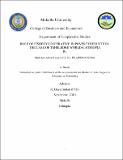| dc.description.abstract | Ethiopia is one of the poorest countries in the world in which socio-economic status of the country
is very low, the daily income of 44 percent of the people is below $1US, unemployment rate stands
at about 54% (49.6% for males and 56.7% for females) and illiteracy rate is very high(UN,2007). It
is of no surprise that, Ethiopia has not managed to reduce the aggravating poverty and
deprivations of their citizens while giving almost no care of promotion and development of
cooperatives. However, since the last decade, there has been a move towards understanding the
potential of the sector. Nonetheless, from the unemployment rate of view, the roles of cooperatives
in poverty reduction in general and fishery cooperatives in particular are insignificant. Therefore,
the study was conducted in Tehuledere woreda of the Amhara region with major objective of
evaluating the role of lego_ardibo primary fishery cooperative in poverty reduction. Since
member s number is easily manageable, census method was used and primary data were collected
from both members and woreda key cooperative officers through structured interview schedule as
well as questionnaire. Data were also presented and discussed using various tools of descriptive
statistics, tables and figures as well. According to the study, before membership sample households
had minimum yearly working days of 20 members and the maximum yearly working days were 121
with 55 mean and 29 standard deviations. After membership, the majority 83(56%) of members are
full time workers in fishery and have got an employment between101and 200 days in a year, and
some members have got up to 100 man days of part-time employment. In addition family members
and hired labors also have got full and part-time work opportunities. The majority 126 (82.8%) of
member`s monthly income was ranged from 0-400 Birr before membership. However, after
membership, 115(75.6%) of their monthly income increased and ranged from 401-1000 Birr.
Member s average annual expenditure is increased from 424.64 Birr to 940 .35 Birr The result
shows that, lego_ardibo primary fishery cooperative has a positive contribution to its members in
relation to their income, employment creation, increasing production and productivity, better
access to education, medical care, housing and food consumption and market creation as well.
Thus, LAPFC plays its own role in poverty reduction in the selected woreda. | en_GB |


